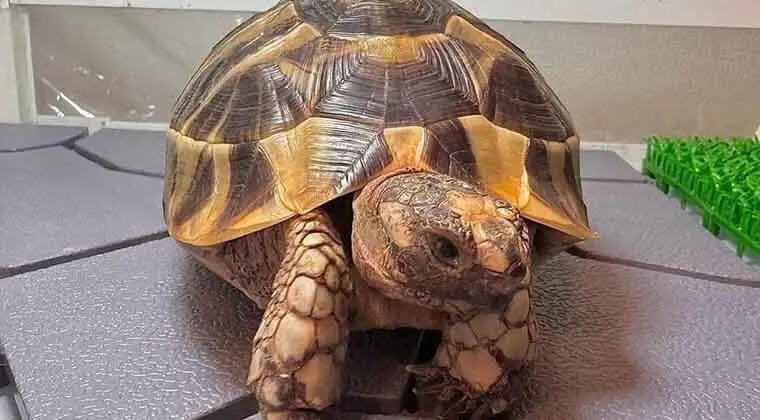Yes, turtles can eat cabbage. Cabbage is a nutritious food for them and can be part of their diet in moderation. It should only be fed to your turtle occasionally as it contains high amounts of oxalic acid which can interfere with the absorption of calcium if too much is eaten.
When feeding cabbage to your turtle, you should feed it fresh and cut it into small pieces or shredded so that they are easier to consume. Steaming the cabbage first will help make sure all the nutrients are retained during digestion and reduce any potential issues caused by the oxalic acid content.
Furthermore, offer other vegetables such as carrots, spinach, and squash along with some animal protein sources like mealworms or crickets to ensure a balanced diet for your turtle’s health.
Can Red-Eared Slider Turtles Eat Cabbage?
Red-Eared Slider Turtles are omnivorous and can include cabbage in their diet. Cabbage is an excellent source of vitamins, minerals, and other nutrients that can help keep your turtle healthy.
It should be fed in moderation as part of a varied diet to ensure your turtle receives all the necessary nutrients for optimum health. Cabbage should always be fresh and washed before serving to avoid any contamination from pesticides or other chemicals.
Can Turtles Eat Purple Cabbage?
Turtles can certainly eat purple cabbage! It’s a great source of vitamins A, C, and K, as well as dietary fiber. Turtles should only have small amounts of cabbage as part of their diet; it is best fed in moderation due to its high calcium content which could cause health issues if eaten too often.
Additionally, it’s important to make sure the cabbage isn’t wilted or slimy before feeding it to your turtle since spoiled food can be dangerous for them.
What Vegetables Can Turtles Not Eat?
Turtles are omnivorous, meaning they eat both meat and vegetation in their natural habitats. However, there are some vegetables that turtles should avoid eating as they can be toxic or harmful to them.
Some of the vegetables that turtles should not eat include onions, garlic, avocados, rhubarb leaves and stems, mushrooms, potatoes (raw), tomato plants and fruit (green parts), eggplant leaves and stems, cabbage family plants (including broccoli) as well as chili peppers.
Eating these foods could lead to digestive problems for your turtle such as vomiting or diarrhea which can easily become fatal if left untreated. Additionally, turtles may also suffer from anemia due to a lack of iron caused by consuming too many acidic fruits like lemons or limes which can cause the turtle’s blood cells to break down prematurely leading to severe health issues.
It’s important therefore to ensure you only feed your pet turtle approved vegetables such as carrots, squash, or sweet potatoes which contain essential vitamins and minerals needed for their overall health and well-being.
Is Cabbage Safe for Red Eared Sliders?
Cabbage is a nutritious vegetable that can be safely included in the diet of red-eared sliders. Red eared sliders are omnivores and they need both animal proteins, vegetables, and fruits to stay healthy. Cabbage provides them with vitamins A, B1, B2, C, and K as well as fiber and minerals like calcium and phosphorus.
It also contains antioxidants that help protect against free radicals that cause cell damage. To feed your slider cabbage you should cut it into small pieces so it’s easier for them to digest. You can either boil or steam the cabbage before feeding it to your pet turtle or simply offer it raw if he prefers crunchier food items.
As part of their regular diet make sure not to overfeed cabbage since too much could cause health issues such as digestive problems or weight gain due to its high calorie content.
What Foods Are Poisonous to Turtles?
Turtles are omnivorous animals, meaning they eat both plant and animal matter. While this gives them a wide range of food to choose from, some foods can be toxic or even poisonous to turtles.
These include anything with high levels of salt, sugar, or fat like chips and candy; processed meats such as hot dogs and bacon; citrus fruits including oranges, lemons, and limes; raw potatoes; grapes and raisins; avocados (especially the skin); onions; garlic; mushrooms; alcohol and caffeine.
Ingesting any of these foods can cause digestive problems for your turtle ranging from mild discomfort up to organ failure in extreme cases. It is also important to remember that wild turtles will often consume things out in their environment that could be harmful – so if you keep a pet turtle it’s best to stick with commercial turtle diets specifically designed for your pet’s health needs.
What is the Best Vegetable for Turtles?
Turtles are omnivorous creatures, meaning they eat both meat and vegetation. The best vegetable for turtles is one that is rich in vitamins, minerals, and other essential nutrients. Leafy greens such as kale, collard greens, turnip tops, dandelion leaves, and romaine lettuce are packed with protein and calcium which help to keep your turtle healthy.
You can also supplement their diet with some fruits like apples or melons. Dark green vegetables like broccoli or spinach provide vitamin A while squash provides beta-carotene to boost their overall health.
Furthermore, bell peppers contain antioxidants that protect them from illnesses while carrots support healthy eyesight. All of these vegetables should be chopped up into small pieces before feeding them to your turtle so they can easily digest it.
Feeding tortoises a cabbage
Conclusion
It can be said that cabbage is indeed safe for turtles to eat. Not only does it contain many essential nutrients, but also allows them to enjoy a variety of flavors and textures in their diets.
When feeding your turtle cabbage, make sure you feed it in moderation as too much of any food could lead to digestive issues and other health problems.
Furthermore, always consult with an experienced veterinarian if you have any doubts or questions about the nutrition of your pet turtle.
